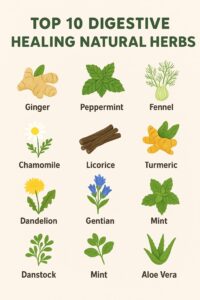

Gut Health Revolution: 10 Natural Herbs for Digestive Wellness
The ancient wisdom that “all health begins in the gut” has never been more relevant than today. With digestive issues affecting millions worldwide, from bloating and IBS to acid reflux and poor nutrient absorption, the search for natural solutions has led many back to the healing power of natural herbs. Unlike conventional medications that often mask symptoms, herbal remedies work synergistically with your body’s natural processes to restore digestive balance and promote long-term gut health.
Your digestive system is far more than a food processing center, it’s your second brain, housing 70% of your immune system and producing neurotransmitters that directly impact mood and mental clarity. When your gut is out of balance, the effects ripple throughout your entire body, contributing to everything from chronic inflammation to mental fog.
The modern lifestyle presents unique challenges to digestive health. Processed foods, chronic stress, environmental toxins, and overuse of antibiotics can disrupt the delicate ecosystem of your gut microbiome. This is where traditional herbal medicine offers profound healing potential, providing gentle yet effective support for optimal digestion and overall wellness.
Understanding Digestive Imbalance

Before diving into specific natural herbs, it’s crucial to understand the signs of digestive dysfunction. Bloating after meals, irregular bowel movements, heartburn, excessive gas, and food sensitivities are all indicators that your digestive system needs support. These symptoms often stem from inflammation in the gut lining, imbalanced gut bacteria, insufficient digestive enzymes, or compromised intestinal permeability and commonly known as “leaky gut.”
The gut-brain axis, a bidirectional communication network between your digestive system and brain, means that digestive issues can manifest as anxiety, depression, brain fog, and mood swings. Similarly, chronic stress can significantly impact digestion by reducing enzyme production and altering gut motility. This intricate connection underscores the importance of addressing digestive health holistically.
Environmental factors also play a significant role. Exposure to processed foods laden with artificial additives, excessive sugar consumption, and the modern diet’s lack of fiber-rich plants all contribute to digestive imbalance. Additionally, medications like NSAIDs and antibiotics, while sometimes necessary, can damage the protective gut lining and deplete beneficial bacteria.
The Science Behind Digestive Natural Herbs
Herbal medicine for digestive health works through multiple mechanisms. Many natural herbs contain compounds called bitter principles, which stimulate the production of digestive juices and enzymes when they contact taste receptors on the tongue. This ancient “bitter before sweet” principle enhances the entire digestive cascade, from salivation to stomach acid production.
Anti-inflammatory compounds found in many digestive herbs help calm irritated gut tissue and reduce systemic inflammation. Mucilaginous herbs create a protective coating along the digestive tract, soothing inflamed tissues and promoting healing. Carminative herbs help expel gas and reduce bloating, while cholagogue herbs stimulate bile production, essential for fat digestion and toxin elimination.
The concept of entourage effect, where plant compounds work synergistic to enhance therapeutic benefits and explains why whole natural herbs often prove more effective than isolated compounds. This natural synergy allows for gentle, sustained healing without the harsh side effects often associated with pharmaceutical interventions.
Top 10 Digestive Healing Natural Herbs

1. Peppermint: The Digestive Soother
Peppermint stands as one of the most researched and effective digestive herbs, particularly for IBS symptoms. The menthol content relaxes smooth muscles throughout the gastrointestinal tract, reducing spasms and cramping. Clinical studies demonstrate significant improvement in IBS symptoms with peppermint oil supplementation.
The cooling nature of peppermint makes it particularly effective for digestive heat and inflammation. It stimulates bile flow, enhances gastric emptying, and has mild antimicrobial properties that help maintain healthy gut flora balance. For optimal benefit, peppermint is best consumed as enteric-coated capsules or fresh tea after meals.
2. Ginger: The Digestive Fire
Ginger’s warming properties make it exceptional for weak digestion and nausea. Its bioactive compounds, gingerols and shogaols, stimulate digestive enzyme production and enhance gastric motility. Research confirms ginger’s effectiveness for morning sickness, motion sickness, and chemotherapy-induced nausea.
Beyond nausea relief, ginger addresses root causes of digestive dysfunction by reducing inflammation and supporting healthy gut bacteria growth. Its prokinetic effects help food move efficiently through the digestive tract, preventing stagnation and bacterial overgrowth. Fresh ginger tea or crystallized ginger provides excellent digestive support.
3. Turmeric: The Anti-Inflammatory Powerhouse
Turmeric’s active compound, curcumin, offers potent anti-inflammatory benefits for the entire digestive system. It supports liver function, enhances bile production, and helps heal damaged gut lining. Studies show turmeric’s effectiveness in managing inflammatory bowel conditions and supporting overall digestive wellness.
The hepatoprotective properties of turmeric make it particularly valuable for those with poor fat digestion or liver congestion. It stimulates phase II liver detoxification and supports glutathione production, crucial for processing toxins. Combined with black pepper for enhanced absorption, turmeric becomes a cornerstone of digestive healing protocols.
4. Fennel: The Carminative Classic
Fennel seeds contain volatile oils that provide excellent carminative action, making them ideal for gas, bloating, and intestinal cramping. The compound anethole relaxes intestinal muscles while promoting the expulsion of trapped gases. Mediterranean cultures have long used fennel as an after-dinner digestive aid.
Fennel’s gentle yet effective nature makes it safe for children and sensitive individuals. It supports healthy gut motility, reduces inflammation, and has mild antimicrobial properties. Chewing fennel seeds after meals or drinking fennel tea provides immediate digestive comfort.
5. Chamomile: The Gentle Healer
Chamomile’s anti-inflammatory and antispasmodic properties make it exceptional for sensitive stomachs and stress-related digestive issues. The flavonoid apigenin provides calming effects on both the nervous and digestive systems. German chamomile, in particular, offers superior anti-inflammatory benefits.
The nervine qualities of chamomile address the gut-brain connection, helping to calm digestive upset triggered by stress and anxiety. It soothes inflamed mucous membranes, reduces gastric irritation, and promotes restful sleep. Chamomile tea serves as both medicine and comfort. Chamomile tea serves as both medicine and comfort, and can be found among our carefully selected herb collection.
6. Licorice Root: The Protective Coating
Licorice root’s demulcent properties create a protective coating along the digestive tract, making it invaluable for ulcers, acid reflux, and inflammatory conditions. The compound glycyrrhizin provides anti-inflammatory and healing benefits, while flavonoids offer additional antioxidant protection.
Deglycyrrhizinated licorice (DGL) removes the compound that can affect blood pressure, making it safer for long-term use. DGL tablets chewed before meals provide targeted support for stomach and upper digestive tract healing. This form is particularly effective for peptic ulcers and GERD.
7. Slippery Elm: The Intestinal Band-Aid
Slippery elm inner bark contains abundant mucilage that swells when mixed with water, creating a gel-like substance that coats and protects the entire digestive tract. This natural “bandage” effect soothes inflammation, reduces irritation, and provides a healing environment for damaged tissues.
Particularly beneficial for IBS, colitis, and other inflammatory bowel conditions, slippery elm helps normalize bowel function and reduce symptom severity. Its prebiotic effects support beneficial bacteria growth while its gentle nature makes it suitable for acute and chronic digestive issues.
8. Aloe Vera: The Cooling Healer

Aloe vera’s gel contains over 200 active compounds that provide anti-inflammatory, antimicrobial, and healing benefits. The polysaccharides in aloe support immune function while promoting tissue repair throughout the digestive tract. Its cooling nature makes it particularly effective for hot, inflammatory conditions.
Inner leaf aloe gel, free from the laxative latex compounds, provides gentle healing support for acid reflux, ulcers, and inflammatory bowel conditions. The prebiotic effects of aloe support healthy gut bacteria while its wound-healing properties help restore intestinal permeability.
9. Dandelion: The Digestive Bitter
Dandelion’s bitter compounds stimulate every aspect of digestion, from saliva production to bile secretion. The root particularly supports liver function and bile flow, essential for fat digestion and detoxification. Dandelion leaves provide gentle diuretic effects that support kidney function.
Rich in inulin, a prebiotic fiber, dandelion supports beneficial bacteria growth while providing minerals and vitamins. The bitter taste triggers the vagus nerve, enhancing the entire digestive cascade. Dandelion root tea or tincture taken before meals provides excellent digestive stimulation. Dandelion root tea or tincture taken before meals provides excellent digestive stimulation and is part of our commitment to natural wellness solutions.
10. Marshmallow Root: The Gut Protector
Marshmallow root’s high mucilage content provides protective and healing benefits throughout the digestive tract. Like slippery elm, it creates a soothing coating that reduces inflammation and promotes healing. Its demulcent properties make it valuable for any irritated or inflamed digestive tissue.
The soothing nature of marshmallow root helps calm digestive upset while supporting the healing of damaged gut lining. It’s particularly beneficial for those with sensitive digestion, acid reflux, or inflammatory bowel conditions. Cold water extraction preserves the maximum mucilage content.
For herbs you can trust, check our curated herbal products in Our Locations, Wisdom from the community, refined for your wellness journey.
Creating Your Digestive Wellness Protocol
Implementing these natural herbs into your routine requires understanding your individual needs and constitution. Begin with single herbs to assess tolerance and effectiveness before combining multiple remedies. Timing is crucial bitter herbs work best before meals, while soothing herbs may be more beneficial after eating.
Consider rotating herbs to prevent adaptation and maintain effectiveness. Seasonal variations can also guide herb selection cooling herbs during hot weather and warming herbs during cold seasons. Quality matters significantly, so source natural herbs from reputable suppliers who test for purity and potency.
Integration with lifestyle factors amplifies herbal benefits. Mindful eating, adequate hydration, stress management, and regular movement all support digestive wellness. The herbs work synergistically with these practices to restore optimal gut function.
For those dealing with complex digestive issues, working with a qualified herbalist or integrative healthcare provider ensures safe and effective protocols. They can help identify underlying causes and create personalized treatment plans that address root dysfunction rather than just symptoms. The herbs work synergistically with these practices to restore optimal gut function, and participating in community wellness events can provide additional support and education.
Conclusion: Your Path to Digestive Wellness
The journey to optimal digestive health through herbal medicine offers hope for those seeking natural, effective solutions. These ten natural herbs provide a comprehensive toolkit for addressing various digestive challenges, from acute discomfort to chronic conditions. Their gentle yet powerful healing properties work with your body’s innate wisdom to restore balance and vitality.
Remember that healing takes time, and consistency is key to experiencing the full benefits of herbal medicine. Start slowly, listen to your body, and be patient with the process. The investment in your digestive health pays dividends in improved energy, better mood, enhanced immunity, and overall wellbeing.
As you explore these natural remedies, consider how they might complement other aspects of your wellness journey. The interconnected nature of health means that supporting your digestive system creates positive ripple effects throughout your entire being, bringing you closer to the vibrant health that is your birthright. Our educational blog resources provide valuable information to help guide your wellness journey.
Related Posts
Want to learn more?
Visit one of our 3 locations
Our staff is here to help! Looking for a specific herb or supplement? We got you covered. Need help finding a remedy for a problem you Have? No problem!
Stop on by and see for yourself why Kushi Health & Wellness is one of the top Natural Health Stores in the Carolinas.


